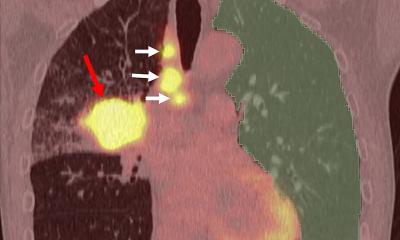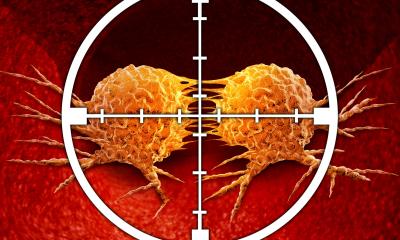News • Checkpoint inhibitor immunotherapy efficacy
AI tool uses routine blood tests to predict cancer immunotherapy response
Doctors around the world may soon have access to a new tool that could better predict whether individual cancer patients will benefit from immune checkpoint inhibitors — a type of immunotherapy — using only routine blood tests and clinical data.

Image source: MSK
The artificial intelligence–based model, dubbed SCORPIO, was developed by a team of researchers from Memorial Sloan Kettering Cancer Center (MSK) and the Tisch Cancer Institute at Mount Sinai. The model is not only cheaper and more accessible, it’s significantly better at predicting outcomes than the two current biomarkers approved by the U.S. Food and Drug Administration (FDA), according to findings published in Nature Medicine.
“Immune checkpoint inhibitors are a very powerful tool against cancer, but they don’t yet work for most patients,” says study co-senior author Luc Morris, MD, a surgeon and research lab director at MSK. “These drugs are expensive, and they can come with serious side effects.”
So the key is patient selection — matching the drugs with patients who are most likely to benefit, Dr. Morris says. “There are some existing tools that predict whether tumors will respond to these drugs, but they tend to rely on advanced genomic testing that is not widely available around the world,” he adds. “We wanted to develop a model that can help guide treatment decisions using widely available data, such as routine blood tests.”
Checkpoint inhibitors target the immune system rather than the cancer itself. These drugs work by taking the brakes off immune cells, allowing them to better fight cancer. MSK clinicians and scientists played a key role in bringing the new class of drugs to patients.
The new study was jointly overseen by Dr. Morris and Diego Chowell, PhD, an Assistant Professor of Immunology and Immunotherapy, Oncological Sciences, and Artificial Intelligence and Human Health at the Icahn School of Medicine at Mount Sinai, and a former postdoctoral fellow at MSK.
Our goal was not just to develop a predictive model, but to develop one that would be widely applicable to patients and physicians in different locations.
Luc Morris
Dr. Morris spoke about the team’s prediction model and next steps for the research: “It was clear there was room for improvement.There are currently two FDA-approved biomarkers for predicting response to checkpoint inhibitors: tumor mutational burden (the number of mutations in a tumor) and PD-L1 immunohistochemistry (evaluating the expression of the programmed death-ligand 1 protein in tumor samples). Both require samples of the tumor to be collected. Meanwhile, genomic testing to assess mutations is expensive and not available everywhere, and there is a lot of variability evaluating PD-L1 expression. Instead, our model relies on readily available clinical data, including routine blood tests performed in clinics around the world — the complete blood count and the comprehensive metabolic profile. And we found that our model outperforms the currently used tests in the clinic.
“The simplicity and affordability of this new approach could help ensure more equitable access to care while also reducing costs and helping ensure patients receive treatments most likely to benefit them individually — whether that ends up being a checkpoint inhibitor or some other type of therapy.
“SCORPIO was initially developed by our team, by collecting data from MSK patients, because of the length and depth of experience oncologists here have treating patients with these drugs. Collaborating with the team at Mount Sinai, we used a type of artificial intelligence called ‘ensemble machine learning,’ which combines several tools to look for patterns in clinical data from blood tests and treatment outcomes. The model was developed using a rich resource of retrospective data from more than 2,000 patients from MSK who had been treated with checkpoint inhibitors, representing 17 different types of cancer. The model was then tested using data from 2,100 additional MSK patients to verify that it was able to predict outcomes with high accuracy.
“Next, we applied the model to nearly 4,500 patients treated with checkpoint inhibitors in 10 different phase 3 clinical trials from around the world. Further validation was done with additional data from nearly 1,200 patients treated at Mount Sinai. In total, the study includes nearly 10,000 patients across 21 different cancer types — representing the largest dataset in cancer immunotherapy to date. We did this extensive testing and validation because our goal was not just to develop a predictive model, but to develop one that would be widely applicable to patients and physicians in different locations.
“We plan to collaborate with hospitals and cancer centers around the world to test the model with additional data from a wider variety of clinical settings. The feedback we receive will help us to continue to optimize the model. Additionally, work is underway to develop an interface that is readily accessible by clinicians, regardless of where they’re located.”
Source: Memorial Sloan Kettering Cancer Center
07.01.2025





